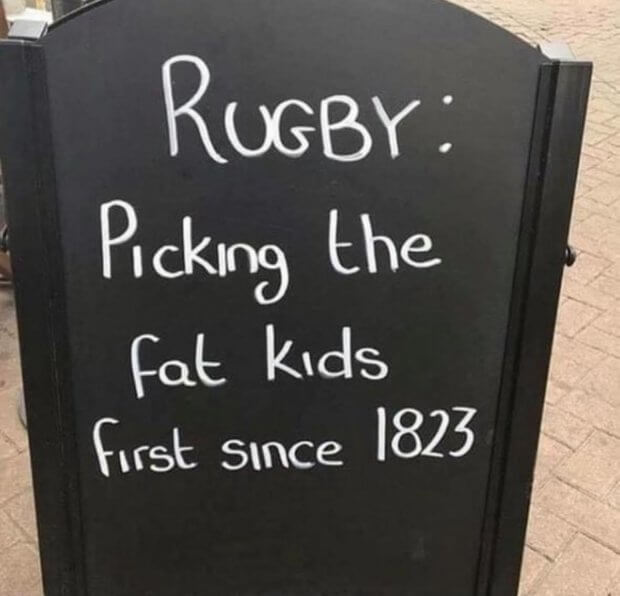Welcome fellow G&GRs. I can feel the levels of anticipation and expectations rise as we slowly, oh so slowly, creep towards the weekend and the opening round of the Rugby Championship. Will our team step up, can it actually win and can we at the least not embarrass ourselves this weekend? I have two levels of expectations. Of course, as always, I expect the All Blacks to win. I know it won’t occur at every game, but it’s always something I expect.
For the Wallabies, it’s a bit different. I’m hoping the Queensland bug will bite and that we’ll see the Boks humbled, again, here in Australia. It hasn’t been a happy hunting ground up there for the Boks and please, oh please, can this continue. However, when I take a realistic look at the teams, the recent history and each team’s standing in World Rugby, I think my expectations are more that the boys will play well and show that they’re developing with a glimmer of hope that it’ll go better and we might just win.
Referee Corner
Not a lot of rugby this week and no incidents to report on. However, on one of the rugby referee sites there was a question raised on a play that generated a whole lot of discussion and demonstrates how complicated this game is, why there’s a lack of consistency and how individual bias from the referee affects the game so much. It was a club game somewhere and the issue was where a ruck had formed, the attacking players blew the defenders off the ball and when the 9 went to pick the ball up he was tackled by two defenders and was then penalised for playing the ball on the ground. The attached pictures show the sequence.
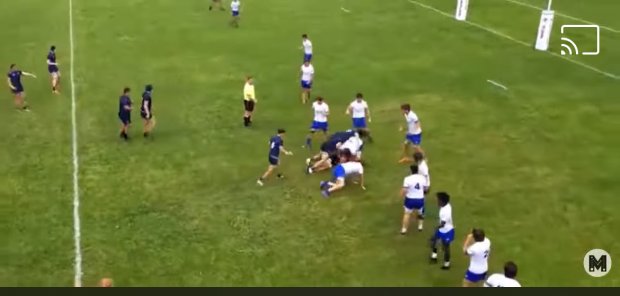
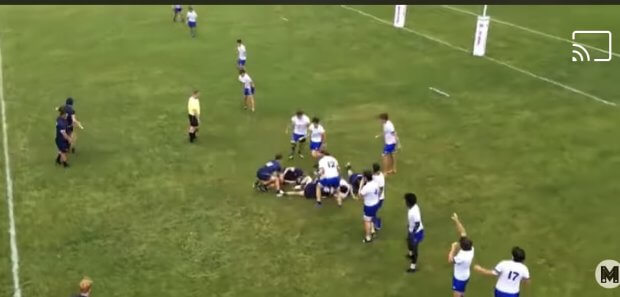
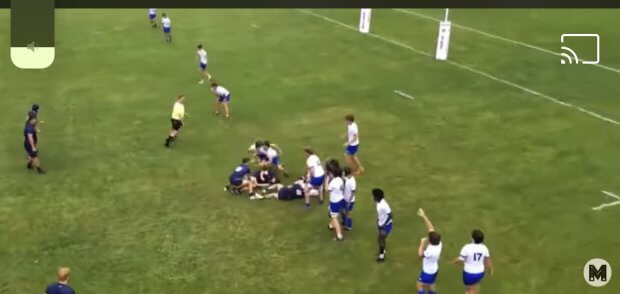
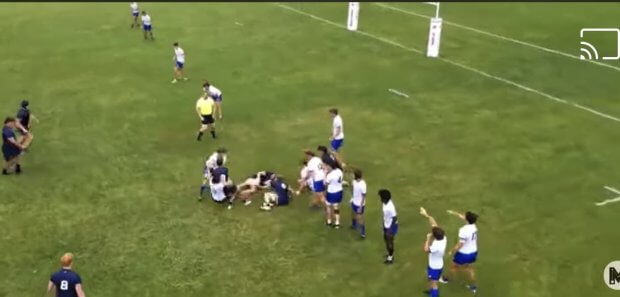
In the first picture the blue team is driving forward to clear the defenders off the ruck. In the 2nd picture they have done this and the 9 is reaching in to clear the ball. What isn’t shown in the picture is that he grabs the ball and then hesitates before starting to lift it out. In the 3rd picture the white defenders are then attempting to tackle the 9 and as shown in the last one they do. The blue players on the ground then flick the ball back and are penalised for playing it on the ground.
The issue that was debated was whether the ruck was over or not and did the white players have the right to tackle the 9. This is pertinent from the new laws put out in yesterday’s G&GR by RAWF where the 9 is to be further protected and unable to be tackled within a metre of the ruck or maul by players who are/were attached to the maul. Now the laws on this are pretty simple. Law 15.2 outlines that “a ruck is formed when at least one player from each team are in contact, on their feet, over the ball which is on the ground” Law 15.4 describes the offside as “each team has an offside line that runs parallel to the goal line through the hindmost point of any ruck participant…..” There are also several other laws outlining how a player joins a ruck, what they are and aren’t allowed to do etc. etc.
The issue that came up for debate was whether the ruck was over when the 9 was tackled. Now the laws on ending a ruck are pretty clear. Law 15.8 and 15.19 cover if the ball leaves the ruck, the ruck goes over the goal line or the ball becomes unplayable. So not part of this. The defining (for me) law; 15.17, says “When the ball has clearly been won by a team at the ruck, and is available to be played, the referee calls “Use It” after which the ball must be played away from the ruck within 5 seconds” This was the hub of the discussion. My view is that, like a counter ruck, once the team driving the opposition off the ball clears them from the ruck so that they are no longer “on their feet, over the ball” and the ball is available to be played by the 9, or anyone else, the ruck is over. For me the bit about the referee calling “use it” is about speeding up the game, not whether the ruck is over. To be fair most of the referees were of a similar view; however, there were also many who thought that the ruck wasn’t over because the ball hadn’t been cleared from where it was or because the referee hadn’t called “use it” and so the white team should have been penalised. Even more were questioning if the white team was onside or not. To be fair the ones closest to the camera absolutely weren’t, but for me, not having a material effect on the game so ignored – all part of that tactical application of the law. It’s a marginal decision whether the two who tackled the 9 were onside or not but, to me, they were so close I could’ve accepted it either way.
The main thing about this was that if so many referees have such a different view on this single play, that happened in less than three seconds during the game, it’s not a wonder that we have so many supporters and commentators questioning decisions and arguing about the application. I guess this will always be part of the game and is why I see one of the most critical jobs for a captain and coach is to determine the way a particular referee applies the laws during a game and adapt the team play so that they take advantage of this and not be disadvantaged. For a team playing in a game I referee, absolutely tackle that 9, for other referees, leave him alone and defend against the player he passes to.
‘Home of rugby’ to be renamed in 117-year first
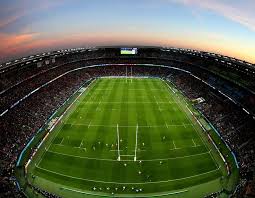
As reported in lots of places but copied from SMH here, the national English home ground of Twickenham will be rebranded Allianz Stadium. The first time it has changed its name since it was built in 1907. The 82,000-seat home of English rugby – where Nick Farr-Jones famously lifted Australia’s first Rugby World Cup in 1991 – is to be renamed from September after the Rugby Football Union signed a long-term deal with the insurance company on Monday. The first fixture at Twickenham under its new name will be the women’s Test between England and New Zealand on September 14.
This is the last national stadium in UK and Ireland to be renamed after a branding right sale and comes after the RFU reported a loss of £6.3 million ($12.4m) and operating profit of £4 million when announcing its figures for the 2022-23 financial year. Sports branding experts believe the move will bank the RFU a considerable amount of money with previous deals with Scotland’s Murrayfield reputed to be worth about £5m a year, the Twickenham name change is likely to be worth more.
The deal comes after a statement from the RFU said it was operating in a “very difficult financial environment,” a fact underlined by the collapse of Wasps, Worcester and London Irish during the 2022-23 season.
While I can see how some of the old boys, such as our own “Keith”, will bemoan the name and see it as the start of the decline of the traditions that make rugby so great, I’m pretty ambivalent about the whole thing. For me if the funds are used well and enable other teams not to go under, then it’s all good. I don’t think the name affects the passion of the players or supporters for a match, for me it’s a good idea.
Of course there’ll be many who will refuse to change and will continue to call it Twickenham; however, I don’t think it matters. Allianz have got their PR, the RFU will have their money, and rugby will keep going. A win/win/win for me.
Schmidt wants Wallabies to rise to Springbok challenge
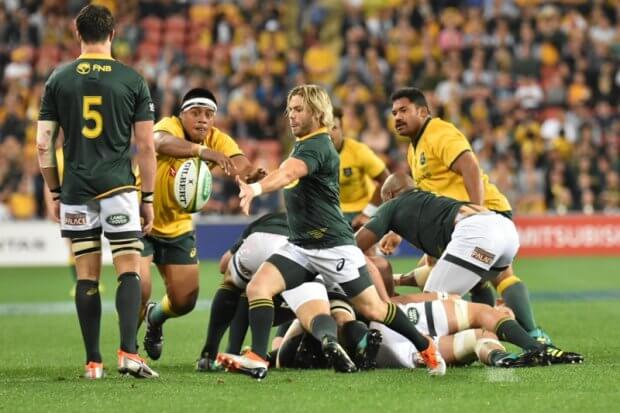
Reported here on rugby.com.au, Joe Schmidt might be on the crest of a winning wave but he’s not underestimating the challenge his side faces against back-to-back world champions, South Africa. Two victories over Wales and one against Georgia under Schmidt, following a consolation win over Portugal in their last match of the World Cup, means Schmidt’s side are seeking to become the first Wallaby team to win five straight since 2021.
But Schmidt knows the size of the task will rise appreciably against the Springboks, who’ve won seven of their past eight Tests. More recently, they split a tight two-Test home series with Ireland, winning 27-20 in Pretoria then losing 25-24 in Durban, before crushing Portugal 64-21 in Bloemfontein on July 21.
“South Africa looked pretty impressive, with the level and intensity of that Irish series,” Schmidt told reporters. “They don’t need too much luck to fall their way,…they have guys who’ve played a lot of Test match footy together. That breeds a confidence, and an almost unspoken trust among players, that they know what each other are going to do and they have an expectation of them doing it well.”
Schmidt coached against many of the current Springboks in his former roles in charge of Ireland and Leinster, and as part of the New Zealand set-up. But he conceded he might have liked a longer preparation to meet them than he had had with the Wallabies. “I’d like to have had more time, to be honest. It’s very much been a sprint so far,” he said. “There are six new players in, that I haven’t spent time with before. Connecting it all up is a real challenge…but we’ve got a great bunch of young men who are really committed to trying to make sure they are as competitive as possible on Saturday.”
I’m enjoying listening to Schmidt. No false bravado or BS, just straight speaking on the issue with confidence in himself, his coaching team and the players. No doubt the game will be tough, but I feel a lot better with him in charge than I have since McKenzie was last in the job.

